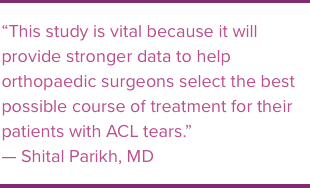PLUTO Researchers Publish First ACL Studies, With More to Come


Orthopaedic specialists have long debated the best way to treat anterior cruciate ligament (ACL) injuries in children and teenagers. The PLUTO (Pediatric ACL: Understanding Treatment Outcomes) Study, which began in 2016, will provide evidence establishing the safety and effectiveness of five common treatment strategies.
Cincinnati Children’s is one of 10 hospitals participating in the observational study, which follows more than 600 pediatric patients who have open growth plates and have undergone treatment for torn ACLs. Researchers are evaluating nonoperative treatment and four different surgical options, including transphyseal ACL reconstruction, partial transphyseal ACL reconstruction, physeal-sparing all-epiphyseal ACL reconstruction and physeal-sparing ACL extra-epiphyseal reconstruction.

Pediatric orthopaedic surgeons Shital Parikh, MD, and Eric Wall, MD, are co-principal investigators for PLUTO at Cincinnati Children’s.
“PLUTO researchers are looking at functional outcomes, activity level, health-related quality of life, graft survivorship, knee stability, knee motion and growth disturbance,” says Parikh, co-director of the Orthopaedic Sports Center at Cincinnati Children’s. “This study is vital because it will provide stronger data to help orthopaedic surgeons select the best possible course of treatment for their patients with ACL tears, helping kids return to healthy activity while minimizing risks of re-injury and other complications, such as arthritis.”
PLUTO is the largest-ever ACL study to evaluate five established treatment options. The group’s first paper, published in 2020, was a systematic review of the metrics used to assess pediatric patients after ACL reconstruction. Subsequent publications provided a systematic review of growth disturbance after ACL reconstruction in skeletally immature patients and nonoperative treatments of pediatric and adolescent ACL injuries. The group hopes to present new findings from PLUTO at upcoming conferences, including POSNA 2022 and AOSSM 2022.

